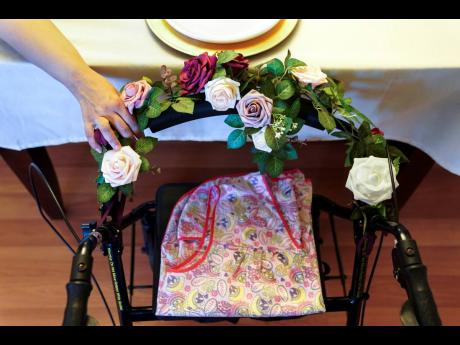Vivian Zayas can’t keep herself from scrolling through photos of last Thanksgiving, when her mother stood at the stove to make a big pot of rice and beans and then took a seat at the edge of the table.
That was before anyone had heard of COVID-19 and before it claimed the retired seamstress. Ana Martinez died at 78 on April 1 while recovering at a nursing home from a knee replacement.
The family had their traditional meal of turkey, yams, green beans and rice and beans – but Zayas removed a seat from the table at her home in Deer Park, New York, this year and put her mother’s walker in its place as a reminder of the loss.
“It’s a painful Thanksgiving. You don’t even know, should you celebrate?” asked Zayas. “It’s a lonely time.”
Americans marked the Thanksgiving holiday yesterday amid an unrelenting pandemic that has claimed the lives of more than a quarter of a million people in the United States.
Turkey and pies still came out of ovens, football was still on TV, families still gave thanks and had lively conversations about politics. But this holiday was utterly altered after months filled with sorrows and hardships: Many feasts were weighed down by the loss of loved ones; others were cancelled or scaled back with the virus surging.
Virtual Connections
Zoom and FaceTime calls became a fixture at dinner tables to connect with family members who didn’t want to travel. Far fewer volunteers helped at soup kitchens or community centres. A Utah health department delivered boxes of food to residents who are infected with the virus and can’t go to the store. A New York nursing home offered drive-up visits for families of residents struggling with celebrating the holiday alone.
“The holidays make it a little harder,” said Harriet Krakowsky, an 85-year-old resident of the Hebrew Home at Riverdale in New York who missed the big Thanksgiving celebrations of years past and has lost neighbours and friends to the virus. “I cry, but I get over it. We have to go on.”
On any normal Thanksgiving Day, Kara McKlemurry and her husband would drive from their Clearwater, Florida, home to one of two places: his family’s home in another part of the state or her family’s house in Alabama. This year, McKlemurry informed her family there would be no visits because of the pandemic. And when her in-laws offered to stop by, the couple said no.
She and her husband didn’t want to risk infecting anyone or getting the virus themselves.
Not everyone followed McKlemurry’s example. Millions of Americans bought tickets to fly somewhere for the holiday, crowding airports despite pleas from officials to avoid travel and gatherings.
In the nation’s capital, the convention centre was empty unlike in previous years, when volunteers worked together to serve a meal to about 5,000 people. In the era of social distancing, the sponsored event had to be reimagined.
Ahead of the holiday, organisers delivered to 20 non-profits 5,000 gift bags, each with winter clothing accessories, hand sanitiser and a mask, and 5,000 boxes that included a turkey sandwich with condiments, a side potato salad, a cookie and utensils.

